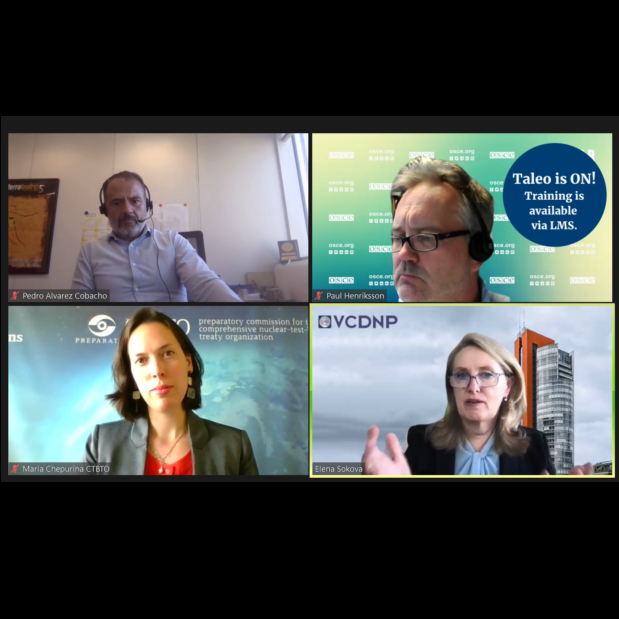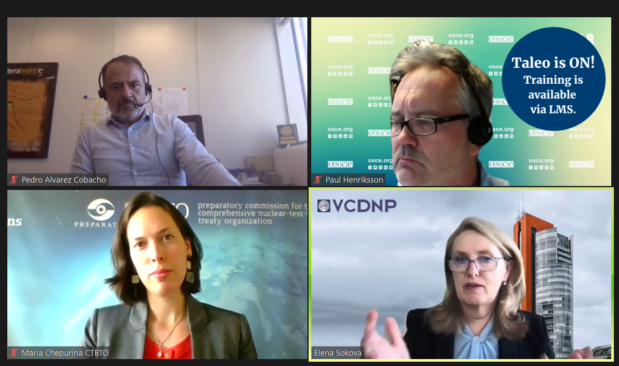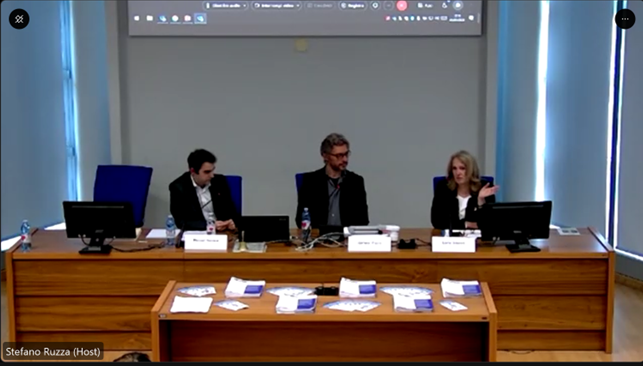
On 6 September 2021, as part of the Young Women and Next Generation Initiative (YWNGI), the Vienna Center for Disarmament and Non-Proliferation (VCDNP) and the International Affairs Institute (IAI) with the support of the EU Non-Proliferation and Disarmament Consortium, organized the third public outreach event focused on tips and insights to work at international organizations.
The webinar, intended for students and young specialists – particularly young women, featured representatives from three major international organisations in Vienna: the International Atomic Energy Agency (IAEA) represented by Pedro Alvarez Cobacho, Acting Head of the Recruitment Unit, the Comprehensive Nuclear-Test-Ban Treaty Organization (CTBTO) represented by Maria Chepurina, External Relations Officer and CTBTO Youth Group Task Force Coordinator, and the Organization for Security and Co-operation in Europe (OSCE) represented by Paul Henriksson, Associate Talent Acquisition Officer.
The event was opened by Elena Sokova, Executive Director of the VCDNP, and was attended by over 300 participants from different regions of the world.

In his remarks, Pedro Alvarez Cobacho offered an overview of the IAEA’s structure and main activities informing the audience about the organisation’s inspiring, culturally-diverse and stimulating working environment. Cobacho noted that the organisation has recently embarked on an ambitious gender-balance mission, hoping to ensure that fifty percent of its employees in professional or higher categories will be women by 2025. With the goal of closing the gender gap and increasing the number of women working in the nuclear field, the Agency has recently opened the application period for The Marie Sklodowska-Curie Fellowship Programme (MSCFP), a scholarship that offers the opportunity to 100 young women to obtain a Master’s degree in nuclear-related studies at accredited universities and to pursue an internship facilitated by the IAEA for up to 12 months. Cobacho then shared some information on other opportunities available at the IAEA, ranging from internships and fellowships to professional posts including scientific visits and consultancies, the Junior Professional Officer (JPO) programme and local recruitment for general service posts. Information regarding these opportunities can be found here.
Cobacho concluded his remarks with some valuable tips and insights on how to best apply to the Agency. The key word was to prepare. Conduct research on the department one is applying to, reach out to people who work there, spend time learning and acquiring the core skills needed for the position and do not leave anything to chance, as the application needs to be impeccable. LinkedIn, ILO core skills and the IAEA application workshops were all mentioned as great resources to become familiar with the application process.
After an overview of CTBTO, its mission, goals and structure Maria Chepurina shared her suggestions on how to start a successful career in the nuclear field and at an international organisation. According to Chepurina, the most important, primary, thing is to “find your ‘why’ and follow your passion and make sure that the job you choose makes you smile when you wake up.” A career cannot be successful if not conducted with passion. Chepurina also stressed the importance of having a very strong command of the English language and, noted that knowledge of other languages can also help build personal bridges with colleagues and co-workers and help one better understand different experiences and opinions. “Take advantage of the opportunity of doing internships,” was another valuable piece of advice offered by Chepurina, as internships are a unique way to realize whether the career one is starting aligns with one’s dreams, passion and desire, and whether it is the right area of work for you to invest your time and energy. Finally, Chepurina stressed the importance of building and cultivating a network, as a way to get information, learn about new opportunities, and share common experiences and lessons learned. To this last point, Chepurina mentioned the CTBTO Youth Group, an international network that the CTBTO has created to facilitate networking among young professionals around the world. Among other opportunities offered by the Organization, Chepurina mentioned internships, consultancies and other professional posts. More information can be found in the detailed guidelines on how to create an applicant profile document, career page and internship page. Additional questions related to recruitment or the application process can be sent to jobs@ctbto.org.
The OSCE is an international organisation composed by 57 participating states and 11 partners around the world that covers mainly three dimensions of security: politico-military, economic and environmental, human security. Paul Henriksson noted that the types of employment offered at the OSCE are similar to those in the UN system and at the IAEA, including internships, fellowships, JPOs, and professional posts. As Chepurina, Henriksson also stressed the importance of conducting internships, as a great way to get a foot in the door given that, at least at the OSCE, most internships translate into full-time positions. Investing time and effort in the application process was defined as paramount. To assist in this process, the OSCE offers specific webinars through its WEBINAR Outreach Programme on how to best prepare for applications and for competence-based interviews. The organization has also created a 10-step recruitment guide to help candidates prepare a strong application. Like the IAEA, the OSCE attaches great importance to a gender-balanced cohort of employees and, besides having a gender strategy, it has established a “women at the OSCE” initiative. As a great opportunity for young professionals interested in working in arms control and non-proliferation, Henriksson mentioned the OSCE-UNODA Scholarship for Peace and Security: Training on Arms Control and Disarmament, a training programme offered by the OSCE and the United Nations Office for Disarmament Affairs (UNODA) to form the next generation of experts in the field. Finally, Henriksson noted that there are several ways to get informed about opportunities at the organization; among others: the talent acquisition newsletter, which is a great resource to stay informed about job openings. More information on job opportunities at OSCE can be found here.
The discussion following the presentations covered a wide-spectrum of topics, ranging from age limits for internships and fellowships, to the definition of “experience” needed to apply for entry level positions, to visa requirements for job opportunities and to strategies and tactics on how to prepare a job application.
The full recording of the outreach event can be found below:

